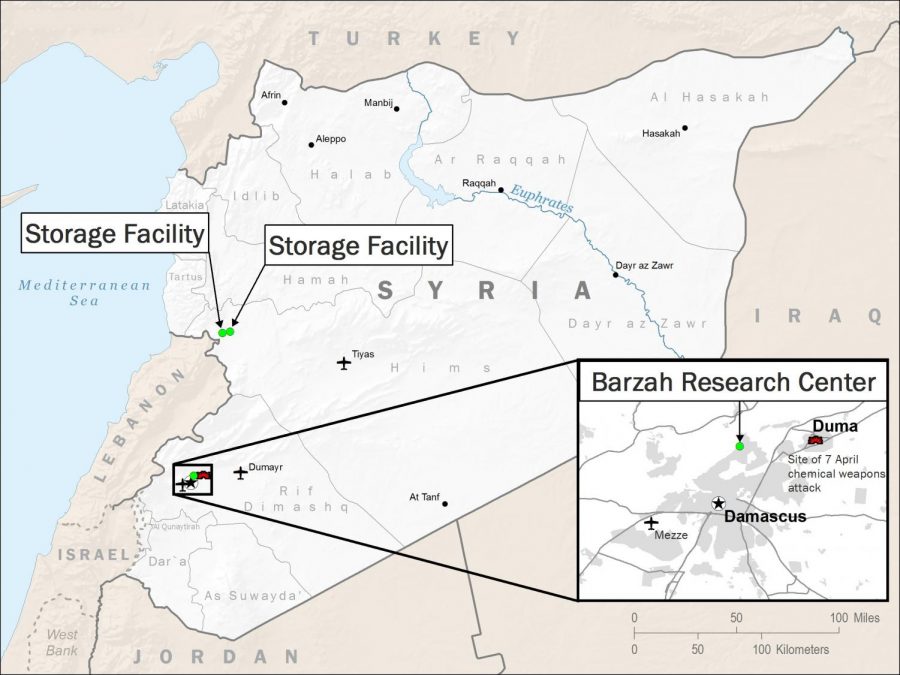Military strike on Syria was the right call
U.S. DEPARTMENT OF DEFENSE/Courtesy Photo
Copy editor Joshua Dausener discusses the joint military strike by the United States, Britain and France on Syria, saying that the strike was the right response to Syrian president Bashar al-Assad’s use of chemical weapons.
Apr 23, 2018
On April 13, the United States, Britain and France struck three facilities believed to be vital components of Syrian president Bashar al-Assad’s chemical weapons program in retaliation to Assad’s regime repeated use of chemical weapons, this time in the rebel-held town of Douma.
The coalition struck three targets: a scientific research center in Damascus, a chemical weapons storage facility west of Homs and a chemical weapons equipment storage facility and command post also near Homs.
In the face of a chemical weapons attack, a military strike on Syria was the right and necessary choice. There is an international consensus that the use of chemical weapons, in any capacity, in any situation against any target, is unacceptable and in violation of international law.
When necessary, it is integral that the United States and its allies back up the rules with force.
Though it is unlikely the strikes will change the tide of the war against Assad, a clear message was sent that breaking the rules has consequences that will hopefully deter future chemical weapons use from Assad or other rogue actors.
This enforcement is necessary to uphold the rules and institution-based system (most notably the United Nations) the U.S. set up after World War II — rules and institutions that have made the world the safest and most stable it has been in human history.
One of the largest blunders of Barack Obama’s presidency was the “red-line” incident earlier in the Syrian conflict, in which the president warned that the use of chemical weapons by the Syrian regime would cross a “red line,” which would provoke “enormous consequences,” and failed to back his statement up with force after Assad used chemical weapons.
This incident weakened America’s word and position.
The recent strikes are a reasonable and moderate response. We can’t do nothing in the face of blatant use of chemical weapons, and there is no appetite in the U.S. for direct, major and prolonged involvement in Syria beyond the 2,000 troops currently stationed there.
Syria can’t become the next Iraq in terms of American involvement.
Striking Syria was the right call, but it isn’t all the Trump administration needs to do moving forward.
The administration should resume plans articulated by Ambassador to the United Nations Nikki Haley to impose sanctions against Syria’s most important ally, Russia, for turning a blind eye to Syrian chemical attacks.
Speaking of America’s word, President Trump needs to immediately stop undercutting what the representatives of his administration say.
Trump calling off previously agreed to Russian sanctions after Nikki Haley spoke about the United States implementing said sanctions is the latest example of the president’s impulsive and incoherent foreign policy. Nobody knows if the United States means what it says, and our world position has weakened because of it.
Along with sanctioning Russia, the United States should also open its doors to additional Syrian refugees.
According to the U.S. State Department, in 2016, the last full year of President Obama’s administration, the U.S. accepted 15,479 Syrian refugees. In 2017, that figure dropped to 3,024 refugees. Four months into 2018, the U.S. has accepted 11 Syrian refugees.
The United States can’t claim to be a leader in humanitarian causes in Syria while simultaneously closing its doors to Syrians fleeing the war-torn country.
Moving forward, the U.S. should be prepared to launch another military strike should Assad again use chemical weapons. At the same time, the U.S. should move to punish the Syrian regime’s enablers and accept more Syrian refugees.









